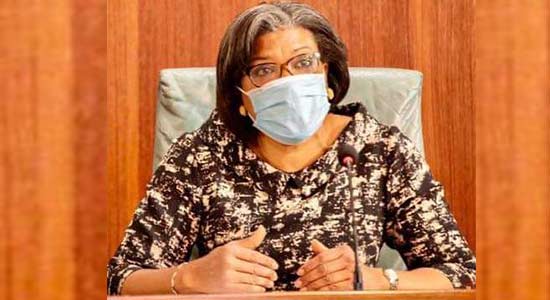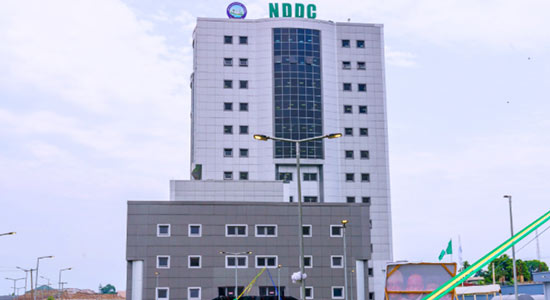Why Government Will Continue to Borrow to Fund Annual Budget – DMO

The Debt Management Office (DMO) on Friday, December 8, told the House of Representatives Committee on Appropriation that unless the revenue generating agencies in the country increase revenue generation and contributions to government treasury, the government will continue to borrow to fund the annual budget.
This was as the Appropriation Committee rejected revenue projection for Government Owned Enterprises (GOEs) and other revenue generating agencies as contribution to fund the 2024 budget.
Also, the Minister of Budget and Economic Planning, Atiku Bagudu, told the committee that President Bola Ahmed Tinubu has directed all ministers to begin to think out of the box on how to increase government revenue.
Speaking when she appeared before the committee, Director General of the DMO, Patience Oniha, said while borrowing to fund critical projects is not bad, increase in revenue generation will reduce government borrowing.
She disclosed that as at June 2023, total government debt stood at N87.37 trillion spread across the three tiers of government and the FCT, with the Federal Government accounting for 90 percent of the debt.
She disclosed that the debt increased because they added the Ways and Means advances to the existing debt.
She said that as borrowing increases, debt servicing will also increase.
Oniha said the DMO was expected to raise about N8.8 trillion from both local and foreign sources to fund the 2023 budget.
She said it has been able to raise N7 trillion from local sources.
She said the country has been running a deficit budget for several years with the DMO required to raise funds locally and internationally to support the budget.
“We run budget deficits because we have projects and programmes in the budget that the government wants to run.
“We usually publish the debt data every quarter. So the most recent data we have in terms of debt stock is as at June 30th of 2023. The figure for public debt is N87.37 trillion. That is made of of external and domestic debt and it is for the federal government and the 36 states and FCT.
“Out of the 87 trillion, about 90 percent belongs to the federal government, I believe, because of the role the federal government plays we account for the largest share. blBut we report everything because that is best practice.
“If you compare that figure to last year December it was 46 trillion naira. So it has grown sharply because we have borrowed and but also because we added the ways and means advances to that number. It is public. It was approved.
“Debt has been growing largely from new borrowings. You see the MTEF for instance that you have approved, it has borrowings in each of the year of 8.7, 10.2 and 11.58 trillion naira just to buttress the point that as you increase the funds the debt stock grows.
“So it is also growing because we have issued promissory notes and again like I said ways and means advances. We usually like to say that debt stock relative to our GDP is not the issue. That has grown from 23 percent in March to about 40 percent in June. The same way the debt stock grew.But we need to do, to focus on is debt service revenue which is very high.
“So apart from trying to generate as much revenue as we should, what else should we be doing? We are advocates for a number of initiatives being taken. Agencies should be privatized if those projects can be better managed. You can attract capital. Do the private public partnership so that it is not everything is on the budget.
‘We should strongly support the Fiscal Reform and Tax Policy Committee, we really need to get that working to change the story of us.
“For this year 2023 the DMO was to provide about 8.8 trillion naira. 7 trillion of that is domestic meaning we borrow it here on naira. And then there is 1.7 trillion that ordinarily in normal times we would have issued euro bonds or from other sources.
“We have been extremely supportive of funding the budget and the operations of government. The other way we try to support Infrastructure is directly with the sukuk. So this year some of that 7 triliion we issued it by way of sukuk and you will soon begin to see the roads across the FCT.”
In his own presentation, the Minister of Budget and Economic Planning said the President has given a marching order to Ministers to ensure that funds are raised to fund the annual budget by thinking outside the box.
He said with the support of the Parliament, the government hopes to generate more revenue and fund the country’s dreams.
He pointed out that government expenditure during the 2024 fiscal year is expected to rise significantly as a result of increases in some capital allocations.
He said the government spending on the education sector will rise to 9 percent of the budget, while others critical sectors will also witness increase spending by the government.
He said out of the 10 most populous countries in the world, Nigeria was running the lowest budget, adding that some important steps need to be taken to ensure a decline in budget deficit.
He said: “Mr. President is ambitious, and he is very clear that Nigeria is not where it is; the revenue we collect is about 10 percent, and the president has directed that we raise it to 18 percent.”
“We understand that the lawmakers are interested in how money is spent. You are also interested in how you can cooperate with the executive to ensure we take Nigeria to a greater heights.”
He said the 2024 proposal had increased spending, which included infrastructure and education, among others.
He added that the budget appropriation had a proposal for N100 billion for the Sustainable Agriculture Fund.
According to him, the government also wants to ensure that the manufacturing sector will worry less about demand than production.
“All of us must work together to ensure we interrogate the revenue-generating agencies. We need a budget that can be trusted. We don’t have money. We are looking for money, so that is why we need to interrogate the revenue-generating agencies,” he said.
However, the Committee insisted that revenue projections for the MDAs and Government Owned Enterprises was too low and must be increased if the government is to reduce borrowings to fund the budget.
The committee chairman, Abubakar Kabir Bichi, said the agencies must appear before it to explain why they are making such “low and ridiculous projections” when they have the capacity to do more.
Bichi noted that reducing the burden of Nigeria’s debt profile, sectoral budgetary allocations, and the dynamics of budget releases, economic diversification strategies, revenue generation forecasts is needed to facilitate the enactment of the bill and effective implementation of the Appropriations Act, 2024.
He said the Minister or Finance and his counterpart in the Ministry of Petroleum Resources have been asked to appear before the committee to explain why the revenue projections of the GOEs is low.
According to him, these revenue-generating agencies must come with money because, without money, there is no magic the president can perform to ensure the realization of the Renewed Hope Budget.
He said President Bola Tinubu’s 2024 budget is fantastic, but money is needed to fund the budget.
Bichi said: “The objective of this engagement is, among others, to provide highlights on some key issues in relation to the preparation, enactment, and implementation of the 2024 budget.”
He said there were concerns about addressing the infrastructural gap in the country, eliminating poverty, and generally achieving the 8-Point Renewed Hope Agenda.
He added that there was a need to ensure that all loose ends to revenue were tied.
This, he said, could have a gross impact on the government’s ability to implement the 2024 Appropriation Bill when passed.
He said: “While the revised MTEF and FSP showed that revenue-generating efforts by the present administration are already yielding fruit, more needs to be done to ensure that government-owned enterprises optimize their revenue-generating potential.”



